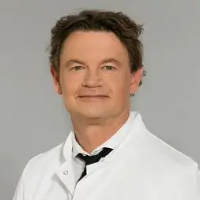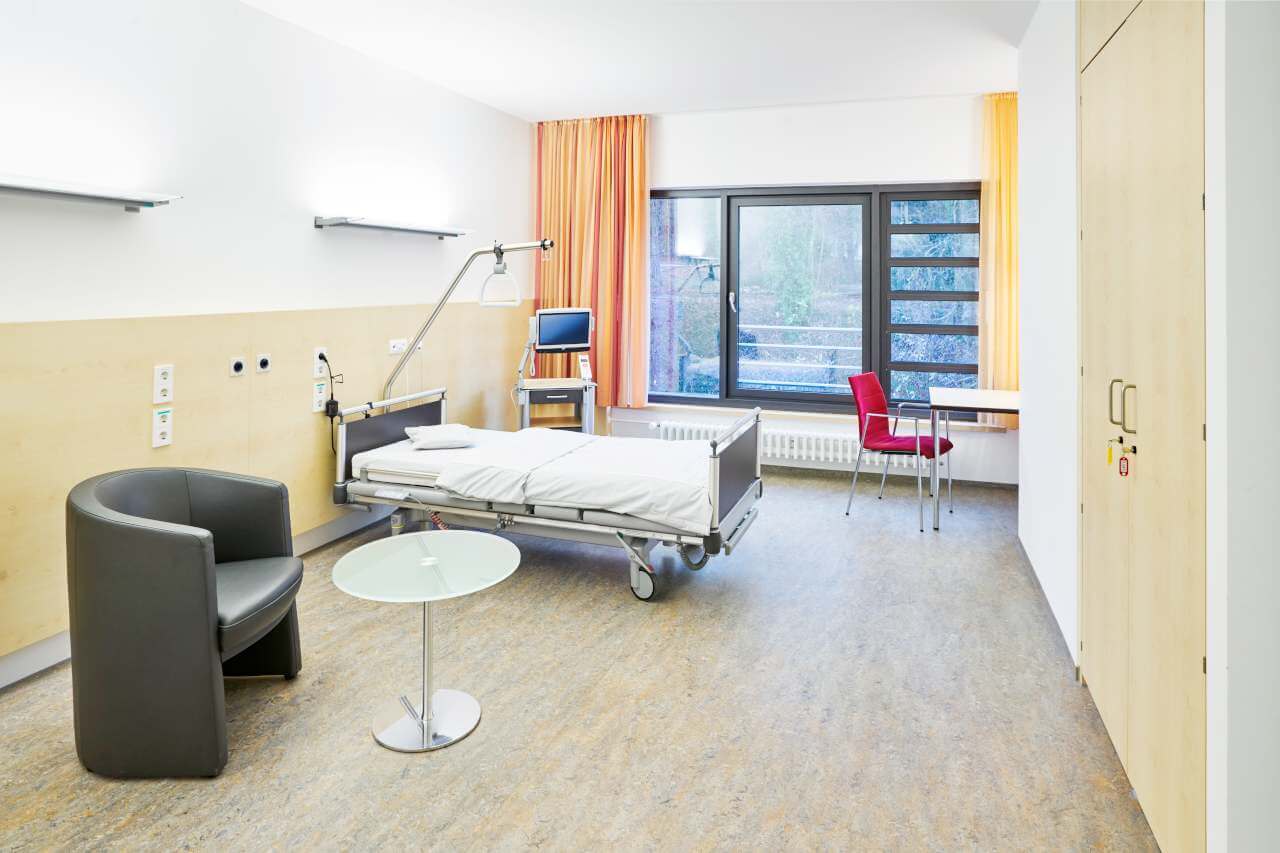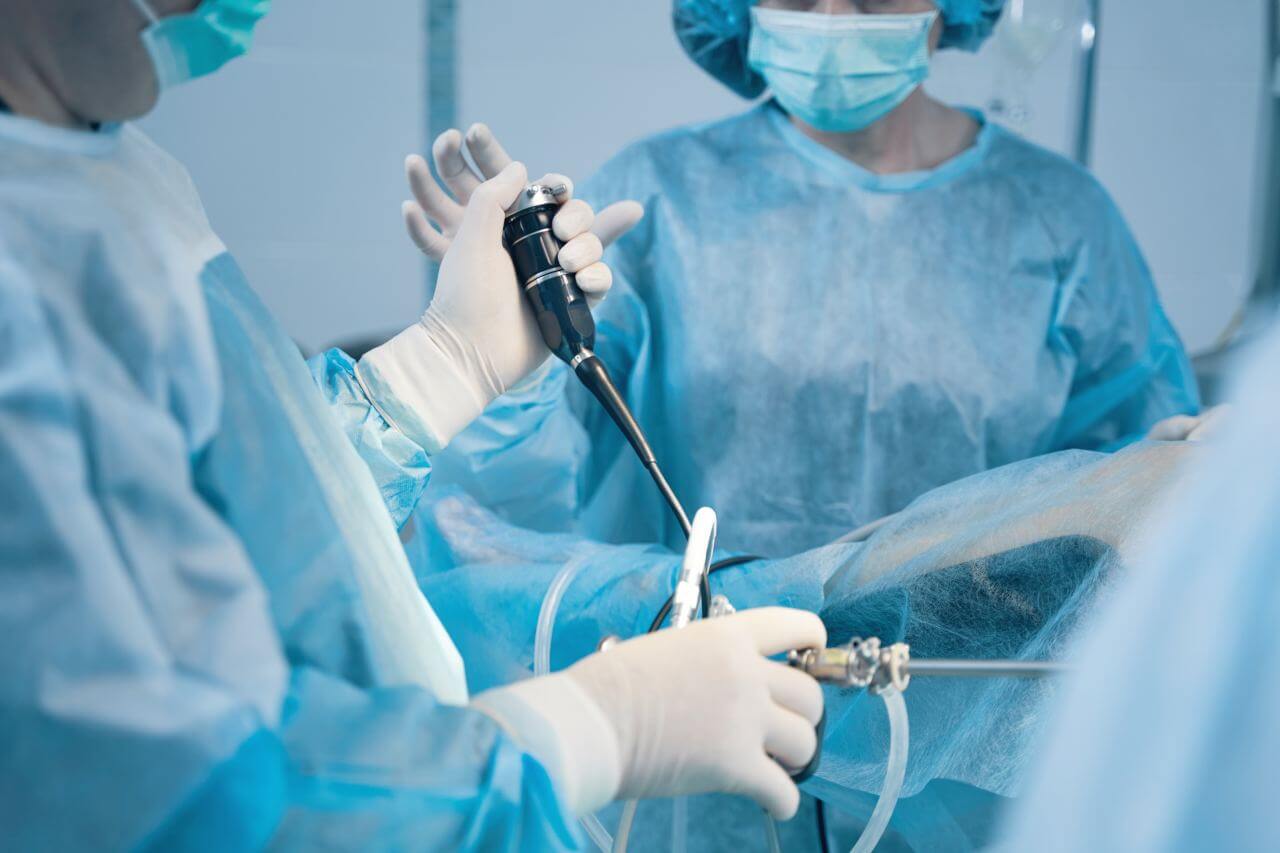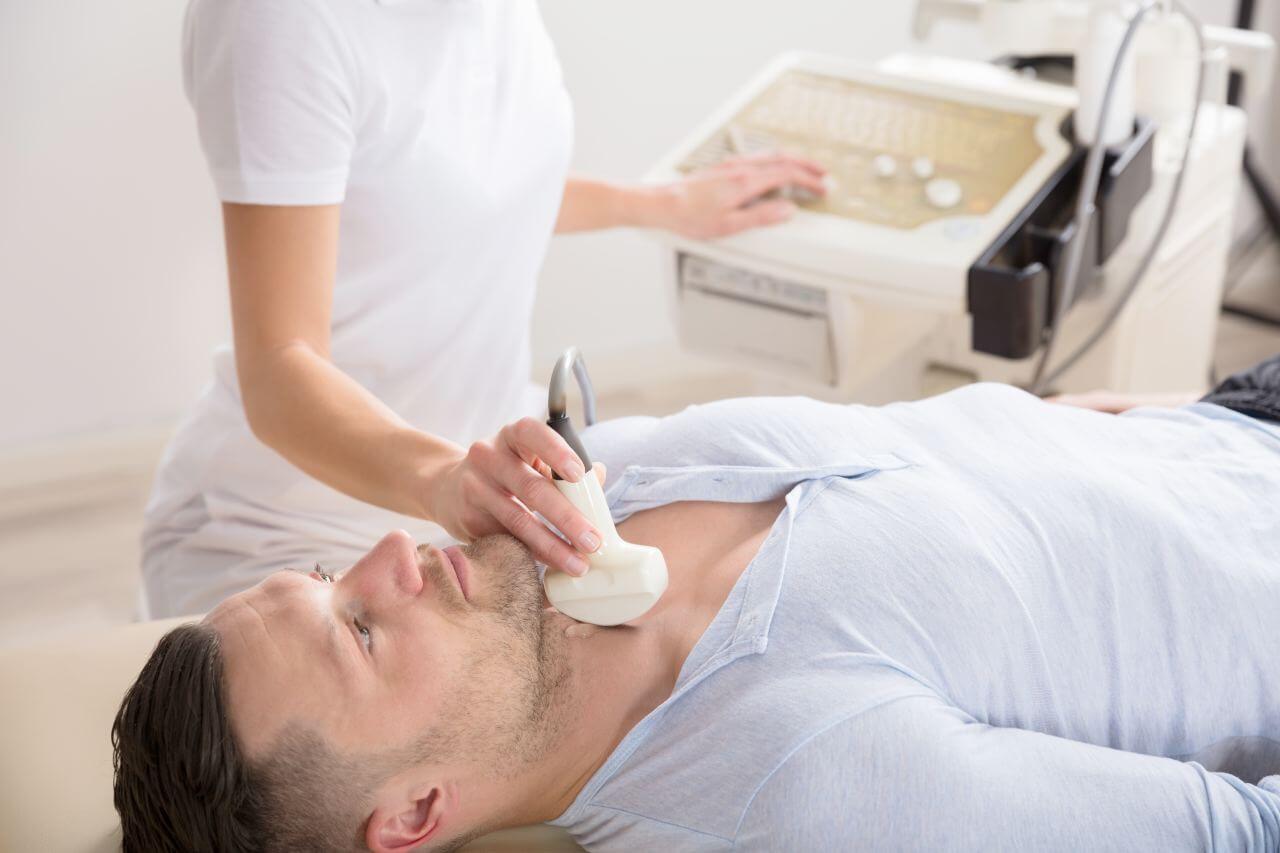
The program includes:
- Initial presentation in the clinic
- clinical history taking
- review of medical records
- physical examination
- laboratory tests:
- complete blood count
- general urine analysis
- biochemical analysis of blood
- inflammation indicators (CRP, ESR)
- indicators blood coagulation
- neurological examination
- functionality x-ray
- neuropsychological tests (on indications):
- ENMG (electroneuromyography)
- SEPs (somatosensory evoked potentials)
- CT/MRI of the spine
- myelography
- preoperative care
- decompressive laminectomy (2-3 segments)
- postoperative control
- symptomatic treatment
- control examinations
- the cost of essential medicines and materials
- nursing services
- full hospital accommodation
- developing of further guidance
Service
You may also book:
 BookingHealth Price from:
BookingHealth Price from:
About the department
The Department of Adult and Pediatric Spinal Surgery at the Schoen Clinic Hamburg Eilbek provides highly effective surgical treatment for the full range of spinal diseases. The department's doctors focus on patients with osteochondrosis, herniated discs, spondylolisthesis, spondylodiscitis, scoliosis, kyphosis, spinal stenosis, tumors, injuries, and rheumatic spinal lesions. The department has an interdisciplinary team of experienced spinal surgeons, neurosurgeons, orthopedists, trauma surgeons, physiotherapists, and chiropractors. Most spinal surgical interventions are performed using sparing minimally invasive, microsurgical, and endoscopic techniques. After such operations, the patients get back on their feet on the day of surgery, the risk of developing postoperative complications is practically eliminated, blood loss is minimal, and pain is alleviated. Spinal surgeons have modern navigation systems and intraoperative neuromonitoring devices, thanks to which the highest accuracy and safety of the operation are guaranteed. For its excellent medical service, the department was certified by the German Society for Spine Surgery (DGW) and the Spine Society of Europe (EUROSPINE) as a Center of Excellence for Spinal Surgery in Germany and Europe. The department is headed by PD Dr. med. Ralph Kothe.
One of the most common pathologies in the department's clinical practice is a spinal disc herniation. The specialists admit patients with cervical, thoracic, and lumbar disc herniations. The department's spinal surgeons are competent in comprehensive diagnostics when this disease is suspected, conservative treatment using oral medications and infiltration therapy (a nerve block through an image-guided injection of anesthetics into the pathological focus), and surgical treatment. The main manifestation of a herniated disc is severe pain, so therapeutic measures are primarily aimed at alleviating pain and improving the patient's quality of life. Great clinical experience and excellent professional skills of the department's spinal surgeons make it possible to achieve recovery with the help of competently developed conservative treatment regimens in many cases: physiotherapists select a set of physical exercises for the patient, qualified experts conduct manual therapy, and doctors also prescribe effective analgesics. A nerve root block may also be performed (a targeted CT-guided injection of anesthetics) for severe pain. If conservative treatment fails, doctors may consider surgical treatment options. The department's surgeons use microsurgical and endoscopic techniques to ensure rapid recovery of the patient in the postoperative period.
The department also pays attention to the treatment of spinal stenosis. Pathology occurs due to degenerative spinal changes and leads to compression of the spinal cord or spinal nerves. Patients with spinal stenosis suffer from pain, gait disorders, and sensation disorders. Treatment begins with conservative methods, such as physiotherapy and drug blocks with anesthetics to alleviate pain. The second-line treatment is a surgical intervention. The decision to perform surgery is made when conservative therapy does not ensure positive results and the patient suffers from severe symptoms. The department's specialists most often perform spondylosis and decompression interventions. These operations are performed using microsurgical and endoscopic techniques under the guidance of intraoperative neuronavigation and computed tomography. The department's spinal surgeons have many years of experience in the treatment of spinal stenosis, so patients can expect the best outcomes.
The specialists at the medical facility regularly admit both adults and children with spinal curvatures such as scoliosis and kyphosis. Scoliosis is characterized by lateral curvature of the spine, while kyphosis causes frontal plane curvature. The team of the department's doctors uses both conservative and surgical methods to repair spinal curvature. The specialists quite often use only comprehensive conservative treatment, including an individually selected set of physiotherapeutic measures, physical therapy, the intake of painkillers, and wearing special corsets. In complex clinical cases, surgeons perform surgical repair of spinal curvature. They perform spondylodesis or microsurgical decompression with foraminotomy. The optimal type of surgical procedure is selected on an individual basis, taking into account the peculiarities of the clinical case. Physiotherapy is also performed after the surgery.
The department's key clinical focuses include:
- Conservative and surgical treatment of herniated discs
- Conservative and surgical treatment of spinal stenosis
- Conservative and surgical treatment of spinal curvatures in both adults and children: scoliosis and kyphosis
- Conservative and surgical treatment of spondylolisthesis (vertebral dislocation)
- Conservative and surgical treatment of osteochondrosis
- Conservative and surgical treatment of spondylodiscitis (inflammation of vertebrae and intervertebral discs)
- Conservative and surgical treatment of spinal epidural empyema
- Conservative and surgical treatment of osteoporotic vertebral fractures
- Conservative and surgical treatment of spinal fractures
- Conservative and surgical treatment of other spinal diseases
The department's range of therapeutic options includes:
- Conservative treatment
- Physiotherapy
- Manual therapy
- Drug therapy
- Therapy with special corsets
- Infiltration therapy (targeted image-guided injection of anesthetics directly into the pathological focus)
- Surgical treatment
- Minimally invasive surgery
- Microsurgical interventions
- Endoscopic surgery
- Other treatment methods
Curriculum vitae
Higher Education and Professional Career
- Since 2011 Head Physician, Department of Adult and Pediatric Spinal Surgery, Schoen Clinic Hamburg Eilbek.
- 06.2010 Board certification in Orthopedics and Trauma Surgery.
- 2006 - 2011 Head Physician, Department of Spinal Surgery, Hospital Dortmund.
- 08.2004 Habilitation in Orthopedics, University Hospital Hamburg-Eppendorf.
- 11.2004 Venia legendi, University Hospital Hamburg-Eppendorf.
- 2002 - 2005 Senior Physician, Department of Orthopedics, University Hospital Hamburg-Eppendorf.
- 07.1999 Board certification in Orthopedics.
- 11.1996 - 12.2001 Research Fellow (C1), Department of Orthopedics, University Hospital Hamburg-Eppendorf.
- 05.1995 - 10.1996 Research Fellow, Department of Orthopedics, University Hospital Duesseldorf.
- Since 1994 Postdoctoral Fellow (fellowship), Biomechanics Laboratory, Department of Orthopedics and Rehabilitation, Yale School of Medicine.
- 07.1992 - 05.1995 Assistant Physician, Department of Trauma Surgery, Nordstadt Hospital Hannover.
- 05.1992 Admission to medical practice.
- 11.1990 - 05.1992 Internship, Department of Trauma Surgery, Nordstadt Hospital Hannover.
- 1984 - 1990 Medical studies, Hannover Medical School.
Prizes, Awards, and Honors
- 2004 Arthur Vick Prize, Association of Orthopedic Rheumatology (ARO).
Memberships in Professional Societies
- 2017 Secretary General, German Society for Spine Surgery (DWG).
Photo of the doctor: (c) Schön Klinik Hamburg Eilbek
About hospital
The Schoen Clinic Hamburg Eilbek is known as one of the largest and most reputable medical centers in Germany. According to the prestigious German Focus magazine, it ranks among the top medical facilities in the country. The medical facility is an academic hospital of the University of Hamburg. This university is one of the best in Germany, thanks to which the world has seen many medical innovations. The clinic offers a wide range of medical fields, including endocrine surgery, general and abdominal surgery, spinal surgery, orthopedics, trauma surgery, cardiology, gastroenterology, radiology, and others.
The clinic is the largest Endocrine Surgery Center in Germany and has gained leading positions in this field in the European medical arena. More than 2,300 surgical interventions of varying complexity are performed at the clinic every year to treat endocrine diseases, and the success rates of the operations performed are at a very high level. In addition, the clinic is distinguished by its outstanding results in spinal surgery, which are confirmed by the quality certificates from the German Society for Spine Surgery (DGW) and the Spine Society of Europe (EUROSPINE). The clinic has the status of a Center of Excellence for Spinal Surgery in Germany and Europe.
The priority of doctors at the clinic is high-quality medical care combined with a humane attitude and sensitive care for the patient during the entire therapeutic process. Only effective and reliable methods are used during the treatment. When a surgical intervention is required, doctors give preference to minimally invasive techniques whenever possible and use navigation devices and intraoperative monitoring systems. After the operation, the patient receives comprehensive care and assistance from experienced specialists.
The clinic has 800 beds. The health of patients is in the safe hands of a competent team of professors, doctors, and nursing staff consisting of more than 2,000 employees. The clinic's team of doctors is convinced that the key to effective medical care is the combination of the professional skills of specialists with state-of-the-art equipment. Therefore, impressive funds are regularly allocated for the purchase of new equipment. For example, in 2019, the clinic opened a new surgical unit, which is equipped according to the very latest standards of modern surgery.
Photo: (с) depositphotos
Accommodation in hospital
Patients rooms
The patients of the Schoen Clinic Hamburg Eilbek live in comfortable single and double rooms designed in light colors. All patient rooms have ensuite bathrooms with a shower and a toilet. The patient room furnishings include a comfortable automatically adjustable bed, a bedside table with a pull-out tray, a wardrobe for storing clothes, a table and chairs for receiving visitors, a telephone, and a TV.
The clinic also offers enhanced-comfort rooms. There is a cozy lounge area with upholstered furniture in the block with enhanced-comfort rooms. In the lounge area, patients are offered hot and cold drinks, light snacks, pastries, and fresh fruits.
Meals and Menus
The patients of the clinic are offered healthy and balanced meals three times a day: breakfast, lunch, and dinner. If, for some reason, you do not eat all the foods, you will be offered an individual menu. Please inform the medical staff about your food preferences prior to treatment.
Patients staying in enhanced-comfort rooms are offered meals at the level of a high-class restaurant with a wide range of main courses, appetizers, and desserts.
Further details
Standard rooms include:
![]() Shower
Shower
![]() Toilet
Toilet
![]() Wi-Fi
Wi-Fi
![]() TV
TV
Religion
The clinic has a prayer room where one can find solitude for prayer at any time. Services by Catholic and Evangelical pastors are also available to patients, if desired. The services of representatives of other religions are available upon request.
Accompanying person
Your accompanying person may stay with you in your patient room or at the hotel of your choice during the inpatient program.
Hotel
You may stay at the hotel of your choice during the outpatient program. Our managers will support you for selecting the best option.





